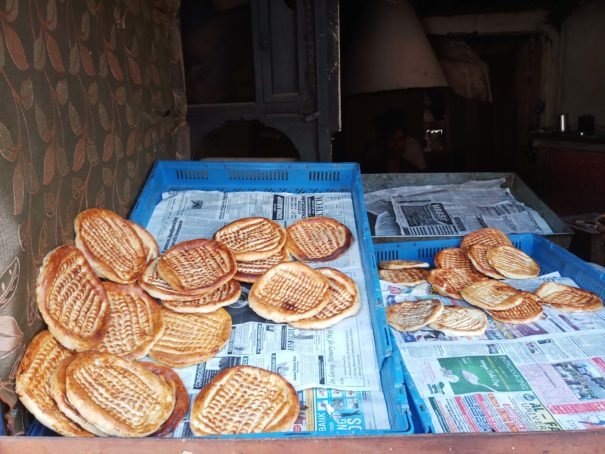
Breakfast in Kashmir is So Good, They Have it Twice

Breakfast in Kashmir is So Good, They Have it Twice
Czot in Kashmir
It was my first time on a houseboat and my first trip to Kashmir. Standing on the deck of the boat, I was excited to start working on my first film when Ajaz, the owner of the houseboat, brought me a cup of tea. It was the first time I tasted Kashmiri nun chai. We Indians love our chai with milk, sugar, and, at times, I add a dash of cardamom seeds to make a Mumbai-style masala chai, but nun chai wasn’t like any other tea I’ve had. It was pink, and salty. (It’s usually served with milk, but I had it without.) I took a reluctant sip and was surprised to enjoy the unusual flavor. Over the three months we spent in Kashmir, nun chai became a staple at every breakfast.
The union of bread with tea is an age-old tradition, and a Kashmiri breakfast pairs the savory tea with fresh-baked loaves from a kandar waz—these bakeries are found in every neighborhood across the valley and the bread is baked in a wood-fired, clay tandoor. On the first morning, Ajaz served us czot and lavasa. Czot is made by mixing refined white flour with water and kneading pieces of dough into thin rectangles. The kandar makes impressions on each piece with his fingertips before putting it into the oven, so the bread has ridges across the surface. I’d smear dollops of butter across its auburn crust and dunk it in nun chai. Lavasa is an unleavened flat bread with a blistery surface. I didn’t enjoy its stretchy texture when dipped in tea, so a Kashmiri colleague made me a delicious roll by stuffing the lavasa with barbecued meat and chickpeas.
The Kashmiris love their bread and chai so much they have it twice every morning. The film’s crew would leave for reconnaissance soon after breakfast, but I stayed back on the houseboat to interview the locals about militancy in Kashmir. The valley has been disputed territory between India and Pakistan for decades. Kashmiris who cross the border into Pakistan and return to India to fight are called militants. Ajaz, like many young Kashmiris, didn’t go the militant way, but is caught between the crossfire between the militants and the Indian army.
In the middle of his interview, Ajaz excused himself for a few minutes and returned with a tray of the pink tea and bakarkhani, a round bread that looks like puffed pastry. It’s brown and crispy on the outside with soft fluffy layers on the inside. I’d never seen this at breakfast, and Ajaz explained that the Kashmiris have specific breads for specific times. Bakarkhani and nun chai became part of our 10 a.m. ritual, when Ajaz and I ruminated over the differences between Kashmir’s past—when it was a center for Sufism and Shaivism—and its fraught present.